- Home
- Richard Flanagan
Gould's Book of Fish: A Novel in Twelve Fish Page 3
Gould's Book of Fish: A Novel in Twelve Fish Read online
Page 3
In the convict records Mr Kim Pearce found several dead William Goulds, while introducing me to a living Willy Gold in the Hope & Anchor; an alcoholic watercolour painter of birds with a cleft palate (the painter, not the birds) at the Ocean Child; and Pete the publican in the snug—a small and comfy taproom—of the Crescent.
Only one of the historical (i.e., dead) William Goulds had a life that seemed to correspond in some ways with the author of the Book of Fish, sharing a similar criminal record and the same tattoo above his left breast—a red anchor with blue wings, wrapped around which was the legend: ‘LOVE AND LIBERTY’. It was this William Buelow Gould, a recidivist convict artist, who upon arriving in 1828 at the Sarah Island penal settlement, was charged with the specific duty of painting fish for the surgeon.
While such detail tallied with the life described in the Book of Fish, the historical Gould’s subsequent convict record suggests a life entirely at odds with that which had so captivated me. It sometimes seemed as if the author of the Book of Fish, the storyteller William Buelow Gould, had been born with a memory but neither experience nor history to account for it, and had spent forever after seeking to invent what didn’t exist in the curious belief that his imagination might become his experience, and thereby both explain and cure his problem of an inconsolable memory.
After such bafflement, imagine then my astonishment upon discovering in the hush of the Allport Library a second Book of Fish, attributed to the convict artist William Buelow Gould, which contained wondrous paintings identical to the Salamanca Book of Fish in all but one detail, a similarity so remarkable that I felt I was choking for want of air.
I took aside the kindly Mr Pearce, who had been so helpful, and explained why I had so loudly gasped.
I told him how I had discovered that there were clearly not one but two books of fish; how these two works that seemed so precisely to mirror each other were at once the same and yet fundamentally different. While one (the Allport Library Book of Fish) contained not a single written word, the other (the Salamanca Book of Fish) teemed with words as the ocean did fish, and these schools of words formed a chronicle that explained the curious genesis of the pictures. One book spoke with the authority of words and the other with the authority of silence, and it was impossible to tell which was the more mysterious.
‘Indeed,’ said Mr Kim Pearce, proffering without comment some Mylanta tablets, ‘their very mystery is heightened by each book’s distorted reflection of the other.’
I rushed home, grabbed my meat-safe edition from its hiding place behind the bathroom mirror, and retired to a nearby hotel once more to indulge myself in drink and fish.
And here, before I go any further, I must make mention of a second unusual attribute of the Book of Fish in addition to its self-illuminating cover, a remarkable quality that seemed to mirror life. I have mentioned how the book seemed never to really finish. But that is not the whole truth. Even now I hesitate before I write it down, this trait so peculiar as to be unbelievable—the refusal of its story to end.
Every time I opened the book a scrap of a paper with some revelation I had not hitherto read would fall out, or I would stumble across an annotation that I had somehow missed in my previous readings, or I would come upon two pages stuck together that I hadn’t noticed and which, when carefully teased apart, would contain a new element of the story that would force me to rethink the whole in an entirely changed light. In this way, each time I opened the Book of Fish what amounted to a new chapter miraculously appeared. That evening, sitting alone at the bar in the Republic—once the old Empire—was no different, except I knew, even in the decrepitude of my mindless passion, that by the very nature of its content what I was reading with growing horror was the last chapter I would ever read.
As I drew close to its conclusion the pages first grew damp beneath my fingers, then wet, and finally, as I felt my heart pounding, as my breathing sped up and I began to heave and pant, I had the inexplicable sense that I was now reading words written at the very bottom of the ocean.
In a state of utter disbelief I came to what I knew to be the ending. I realised that no more multi-coloured chapters would ever again so miraculously appear, and gazing in astonishment at the terrible tale of William Buelow Gould and his fish, I asked for an ouzo to steady my shaking hands, threw it down with a single, unsteady gulp and put it down on a Cascade beer towel, and then, still dazed, wandered off to the toilet.
When I returned it was to find the bar top had been cleared.
I felt my throat contracting and found it suddenly hard to breathe.
VII
THERE WAS NO Cascade beer towel.
There was no drained ouzo glass.
There was no … no Book of Fish!
I was trying to swallow but my mouth had gone dry. I was trying to stand up straight, but I was swaying, beset by a vertiginous fear. I was trying not to panic, but my heartbeat was a deafening roar, monstrous wave after wave of fear crashing on the ocean floor of my soul. Where I had left Gould’s Book of Fish there now remained nothing—nothing, that is, save a large, brackish puddle being mopped up by the barman with a sponge, which he then wrung into a sink.
Only now I realise that the Book of Fish was returning whence it came, that, paradoxically, just as the Book of Fish had ended for me, it was also beginning for others.
Only then nothing was clear. Worse still, no-one in the hotel that night, not the barman nor the several customers, had any recollection of the book ever having been there. A desolate horror, utter and huge as abandonment, gripped me.
Several harrowing, depressing weeks followed in which I pressed the police to no avail to fully investigate this obvious theft. I went back to the Salamanca junk shop in the hopeful, hopeless delusion that by some curious, temporal osmosis the book might have been reabsorbed into its past. I returned again and again to the Republic, spending hours searching under the bar, upending garbage bins, ejecting skateboards and their dozing street-kid owners from the skip out the back in my relentless search, confronting customers and staff over and over, until I was forcibly ejected and told never to return. I spent long hours staring at the putrid outfall of sewage drains under the delusion that the book might there metamorphose.
But after some months, I had to face the awful truth.
The Book of Fish, with its myriad wonders and its horrific, unfolding and ever-growing tale, was gone. I had lost something fundamental and had acquired in its place a curious infection: the terrible contagion of an unrequited love.
VIII
‘TRAVEL? HOBBIES?’ ASKED Doctor Bundy in his cotton-wadding voice that I had grown to hate along with everything else about Doctor Bundy in the five minutes since I first entered his surgery. As I sat back up and put my shirt on he told me that he could find no problem with my health, that perhaps all I needed was some new—some other—interest. On and on he went—had I thought about joining a sporting club? A men’s support group?
I felt the same sensation of breathlessness that had seized me in the Allport Library and then grabbed me in the pub the fateful evening the Book of Fish disappeared. I rushed out of his consulting room. Given that Doctor Bundy refused to countenance the fact of my illness, it seemed not unreasonable for me to refuse to countenance the worth of his remedies. In any case I had no money to travel, no desire to take up a hobby, and a strong aversion to the public humiliations implicit in triathlons or being made to bear-hug sweating New Age dentists in wigwams as they solemnly ran feathers over each other, all the while blubbering about never having known their fathers.
So eating continued to make me nauseous, I spent my nights staring into an ocean of darkness I could never enter, and my waking hours, which were infinite, filled with nightmares of sea creatures, and for a long time I remained inexplicably ill.
In the way they so often do, other tragedies clustered. Great Aunt Maisie died of salmonella poisoning. I spent long hours at her graveside. The book, I came to think, was not unlike th
ose frozen quiches she had once with such gusto produced from her chest freezer with a use-by date stamped for two decades previous, merely waiting for the miracle of the microwave to resurrect. The book was the North Hobart football ground waiting for a few drops of Lourdes holy water and memories of absent love. The book, I began to suspect, was waiting for me.
Perhaps it was in this way my illness took on the form of a mission. Or perhaps only my joy in the glorious wonder of all that Gould wrote and painted explains my subsequent decision to rewrite the Book of Fish, a book in which there is no popular interest nor academic justification nor financial reward, nothing really, save the folly of a sorry passion.
From memories, good and bad, reliable and unreliable; by using bad transcriptions that I had made, some of complete sections, others only brief notes describing lengthy tracts of the book; and by the useful expedient of reproducing the pictures from the wordless Allport Book of Fish, I set about my forlorn task.
Maybe Mr Hung with his shrine to Victor Hugo is right: to make a book, even one so inadequate as this wretched copy you now read, is to learn that the only appropriate feeling to those who live within its pages is love. Perhaps reading and writing books is one of the last defences human dignity has left, because in the end they remind us of what God once reminded us before He too evaporated in this age of relentless humiliations—that we are more than ourselves; that we have souls. And more, moreover.
Or perhaps not.
Because it clearly was too big a burden for God, this business about reminding people of being other than hungry dust, and really the only wonder is that He persevered with it for so long before giving up. Not that I am unsympathetic—I’ve often felt the same weary disgust with my own rude creations—but I neither expect nor wish the book to succeed where He failed. My desire was only ever to make a vessel—however crude—in which all Gould’s fish might be returned to the sea.
But I must confess to a growing ache within, for these days I am no longer sure what is memory and what is revelation. How faithful the story you are about to read is to the original is a bone of contention with the few people I had allowed to read the original Book of Fish. The Conga—unreliable, granted—maintains there is no difference. Or at least no difference that matters. And certainly, the book you will read is the same as the book I remember reading, and I have tried to be true both to the wonder of that reading and to the extraordinary world that was Gould’s.
Though I had hoped he might, Mr Hung doesn’t know. On that wet afternoon when we sat down in front of the log fire in the Hope & Anchor and I put these troubling questions to him—the only person I know who knew anything about books—thinking he might say something that would quell my ever more unruly heart, Mr Hung quaintly ventured the suggestion that books and their authors are indivisible, and—in what I thought a somewhat obscure explanation—told (between Pernods, another curious legacy of the French) the story of how Flaubert, pestered to declare who was the model for Madame Bovary, finally cried out in what Mr Hung claimed to be both exasperation and elation—‘Madame Bovary, c’est moi!’
After this incomprehensible anecdote which left Mr Hung exultant, and me and the Conga—knowing neither French nor literature, and even after Mr Hung’s subsequent translation (‘Madame Bovary is me!’)—little the wiser, the Conga declared she didn’t know either.
‘Perhaps,’ I venture, ‘de Silva is right. It was just a fraud.’
‘Fuck de Silva,’ says the Conga, her face flushing with drink and anger, ‘fuck them all!’
‘Sure,’ I say, ‘sure.’
But in truth I am unsure.
I had begun with the comforting conclusion that books are the tongue of divine wisdom, and had ended only with the thin hunch that all books are grand follies, destined forever to be misunderstood.
Mr Hung says that a book at its beginning may be a new way of understanding life—an original universe—but it is soon enough no more than a mere footnote in the history of writing, overpraised by the sycophantic, despised by the contemporary, and read by neither. Their fate is hard, their destiny absurd. If readers ignore them they die, and if granted the thumbs-up of posterity they are destined forever to be misconstrued, their authors transformed first into gods and then, inevitably, unless they are Victor Hugo, into devils.
And with that, he drains a final Pernod and leaves.
Afterwards the Conga comes over all amorous, stands close by me, leans on me so we pitch and toss like a single boat in a wild sea, furtively reaches beneath my groin and tugs on my balls like they are the cord to a klaxon horn.
Poop—poop!
We end up in her bed together, faces and bodies criss-crossed by the shadows thrown by stacks of unsold Vietnamese Shaker furniture made by a refugee who suspects God to be Victor Hugo and Emma Bovary to be Gustave Flaubert, and her passion evaporates in an instant.
Her eyes glaze.
Her lips quiver.
‘Who are you?’ she suddenly cries aloud. ‘Who?’
And she is frightened, so terribly frightened, and she is seeing someone else, but who it is I have no way of knowing. For her body is abruptly dead and exists only in the most dreadful state of subjugation, and I, despicably, continue for a short time, before my own feeling of horror overwhelms even my overwhelming animal desire and I withdraw.
‘Why are you going?’ the Conga cries out, but now her voice is different, and I realise she is back from wherever she has been.
‘Don’t go, come back here,’ the Conga says and she opens her arms to me, and relieved, I remount. And then once more her eyes glaze, her body deadens, and she cries out again and again, ‘Who are you? Who are you? Who are you?’ and she is crying and this time I simply want to escape this strange circle, and I get up and hastily pull on my clothes, and the Conga all the time saying, as nice as pie, genuinely upset, ‘But why? Why are you going?’ And I am gone because I have no furniture to offer her that might give solace, no fake chairs or tables to trade for her guilty sadnesses, because I cannot answer either for her or for me who I am or who she is, far less what this Book of Fish is about.
How can I tell her that late of a night when melancholia seems to fall with the evening dew, I am taken of the strong fancy that for me alone William Buelow Gould was born: that he made his life for me and me this Book of Fish for him; that our destiny was always one?
Because, you see, it sometimes seems so elusive, this book, a series of veils, each of which must be lifted and parted to reveal only another of its kind, to arrive finally at emptiness, a lack of words, at the sound of the sea, of the great Indian Ocean through which I see in my mind’s eye Gould now advancing towards Sarah Island, now receding; that sound, that sight, slowly pulsing in and out, in and out.
I fell into an old russet armchair in the Conga’s dark lounge room, exhausted from the shameful descent my life had become, and before I knew it, had fallen fast asleep, with a single, insistent question playing like an endless loop deep in my mind.
Who am I …? it was asking. Who am I …?
IX
I SOUGHT THE answer to what for me was a growing enigma by taking refuge in the one place left to the dumb and outdated, the ill and aged and unwanted: the old pubs with their new blinking pokies and that dull stuttering sound peculiar to those souls lost within, spinning away to some outer universe that presages death.
In the course of my journeys through this flickering netherworld I asked any who were for the moment not gambling and whose problems seemed not as great as mine, to come drink with me and tell me what they made of my story and my pictures—photographic reproductions of the pictures from the Allport Book of Fish, tatty with wear—that I would then lay out on the bar to accompany my tale. And I would ask them questions.
A small number would think the pictures rough but not badly done, and the story—as I paraphrased it—entirely mad. Having acquired from the academics I had met in the course of my enquiries the habit of pointless argument, I would try to
persuade my bar colleagues that perhaps in madness lies the truth, or in truth madness.
‘Who was your mother and what secrets did she whisper in your infant ear?’ I would demand of them. ‘Was she a fish?’ I would start yelling. ‘Was she?’
‘The world was stupid in the first place,’ someone said, not in reply but in derision, ‘and it’s only grown stupider ever since.’
‘Travel with me into time,’ I would cry out in answer to such, ‘you dull mullet-eyed men and gurnard-gilded women! Journey with me far from this land of sodden beer mats and amnesiac entertainments to where your heart may be found! Where is the distant land which your soul wishes to traverse? What is it that beats in your belly and troubles your dreams? What shade of the past is it that torments you so? What manner of sea creature are you?’
But to tell the truth, they really weren’t much help at all. They gave me no answer to any of my million and one questions. They took to shunning me even before I opened my mouth, scurrying past to spend the rest of their termination payouts and disability pensions and unemployment cheques, filling their polystyrene Coke cups to the brim with change for the pokies, and then sitting in front of the screens mesmerised at how their hard fates could be so precisely rendered in the perfect image of those spinning wheels.
The few who showed any interest would revile me and laugh at my observation that the meanings of Gould’s Book of Fish were infinite, while others who knew me would tell me to go back to fooling Americans rather than fooling myself. A stranger jobbed me in the mug so hard that I fell off my chair. Everyone around only laughed as he then poured my beer over me, singing, ‘Swim, little fishie! Swim back to the sea!’ all laughing their sad heads off, all, that is, with the exception of Mr Hung, who had just walked in.
Mr Hung put his hands under my arms and dragged me outside. As I lay groaning on the wet bitumen pavement, he felt inside my coat and, finding my wallet, emptied it of cash. He stood up, promised to return, Victor Hugo willing, with enough in winnings to start a fake painting racket. He dissolved into the stuttering neon inside.

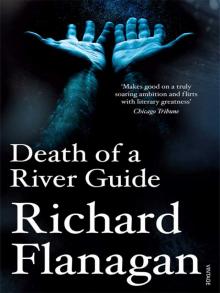 Death of a River Guide
Death of a River Guide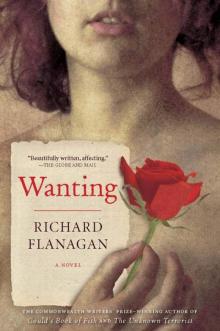 Wanting
Wanting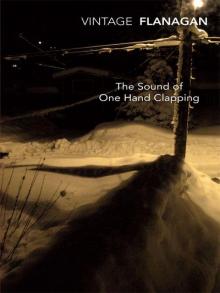 The Sound of One Hand Clapping
The Sound of One Hand Clapping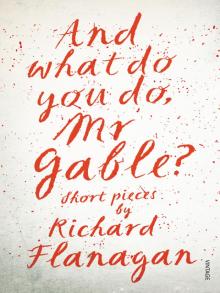 And What Do You Do Mr. Gable?
And What Do You Do Mr. Gable?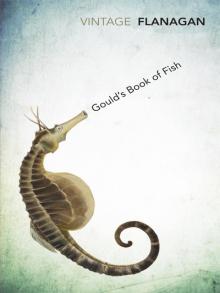 Gould's Book of Fish: A Novel in Twelve Fish
Gould's Book of Fish: A Novel in Twelve Fish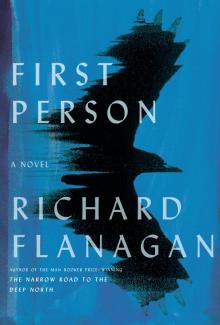 First Person
First Person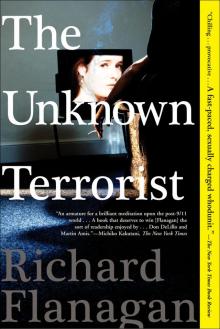 The Unknown Terrorist
The Unknown Terrorist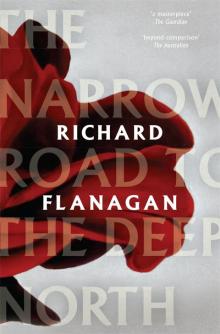 The Narrow Road to the Deep North
The Narrow Road to the Deep North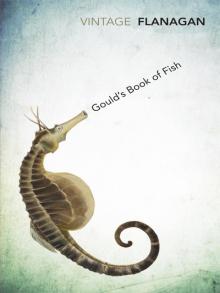 Gould's Book of Fish
Gould's Book of Fish